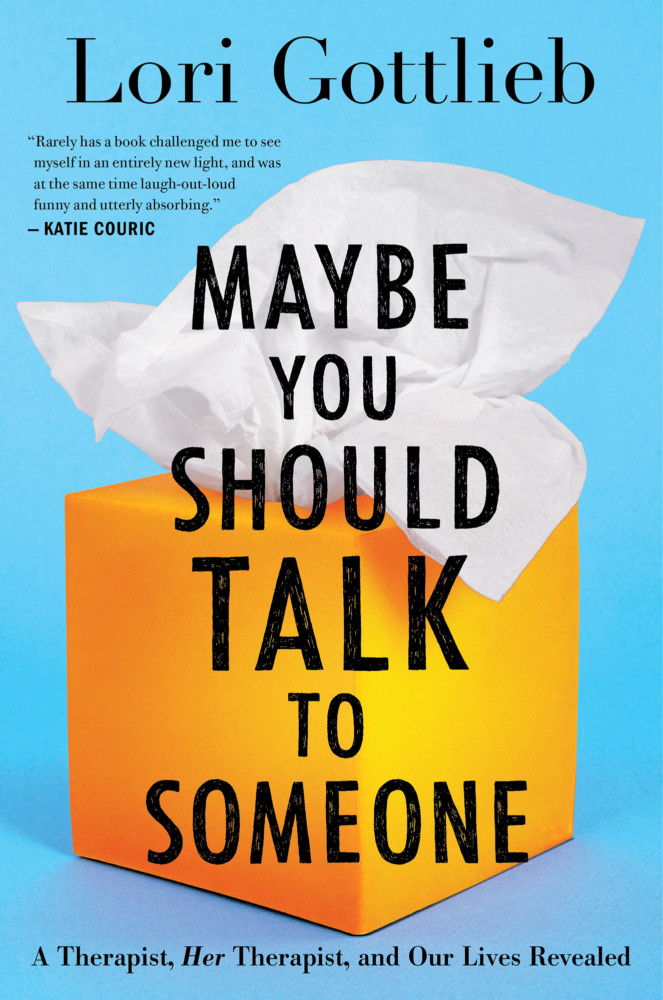By Nicole Brodeur
The Seattle Times
WWR Article Summary (tl;dr) Lori Gottlieb’s new book, “Maybe You Should Talk To Someone,” chronicles her decision to get help, what she learned from it, and how it informed her work with her own patients.
The Seattle Times
After two years, he was done. The man Lori Gottlieb thought she was going to marry didn’t want to raise her 8-year-old son. He had two kids entering college and wasn’t interested in parenting another child.
And just like that, Gottlieb, a Los Angeles-based therapist and the author of the weekly “Dear Therapist” column in The Atlantic, was a mess. She couldn’t sleep. She couldn’t concentrate.
The therapist needed a therapist herself.
Gottlieb’s new book, “Maybe You Should Talk To Someone,” chronicles her decision to get help, what she learned from it, and how it informed her work with her own patients.
The book resonates, Gottlieb said, because readers see themselves in the patients she chose to write about, including a self-absorbed Hollywood producer named John who is irritated by everyone and doesn’t know why.
“People who are demanding, critical, and angry tend to suffer from intense loneliness,” Gottlieb writes. “I know that a person who acts this way both wants to be seen and is terrified of being seen. I believe that for John, the experience of being vulnerable feels pathetic and shameful …”
There is a young newlywed diagnosed with a terminal illness, a senior citizen threatening to end her life on her birthday if nothing gets better, and a 20-something who can’t stop hooking up with the wrong guys. They are depressed, lonely and searching.
“From time to time, on a doozy of a bad day or when pushed until a fragile nerve is struck, everyone exhibits a tad of this or that personality disorder,” Gottlieb writes, “because each is rooted in the very human wish for self-preservation, acceptance, and safety. (If you don’t think this applies to you, just ask your spouse or best friend.)”
The questions they struggle with are the very same that Gottlieb found herself bringing to her own therapy sessions: Are they unkind to themselves? Do they lie to themselves? She also explores her worry that seeking help might make her damaged goods, professionally.
“I think, especially in today’s climate, emotional health gets short shrift,” Gottlieb said. “The book is not a ‘how-to,’ or a ‘self-help,’ but looking inside ourselves through other people’s stories.
“It’s about how we make sense of ourselves and our place in the world. We can see ourselves more clearly through stories instead of bullet points.”
She uses those same techniques in the therapy room: stories and metaphors, which she believes have more impact.
In her column for The Atlantic (where she is a contributing editor), Gottlieb, 52, guides readers through dating issues and family rifts, figuring out their place in the human race with a mix of humor, heart and wisdom. She also writes for The New York Times Magazine and has appeared on national TV talk shows.
That exposure has helped bring the book a lot of advance buzz and support on the road. Gottlieb will spend time onstage with Katie Couric, Scott Simon and Amy Dickinson. Last week, she appeared on NPR’s “Fresh Air” with Terry Gross, an experience she called “a lifelong dream.”
And the book has already been optioned for a television series by Eva Longoria, who is bringing it to ABC.
Gottlieb’s therapy style is “very relational,” in that it is not the same one her patients have with people outside the therapy room. “If they’re pushing people away, people will go away,” she said of her patients. “But I never will.”
Therapy allows people to give their feelings space, to not avoid them.
“We’re afraid of feeling something that makes us feel uncomfortable,” she said. “But if you tamp down the feeling, it just gets bigger. Our feelings are like a compass. They guide us to what we need to pay attention to.”
For example, envy may be uncomfortable, but it can point you to what you want. So listen to it. It may make you anxious, Gottlieb said, “but it will help you understand more about yourself.”
At the time Gottlieb was dumped, she had been working on another book, based on a 2011 story she had written for The Atlantic called “How to Land Your Kid in Therapy.” It tracked how, in a misguided effort to make sure their kids were happy and secure, parents weren’t preparing them to deal with hardship and disappointment. Those now-grown kids were coming into Gottlieb’s office feeling acute emptiness and depression because their parents had smoothed every wrinkle in their lives.
But Gottlieb couldn’t get any traction on that story. She wanted to tell her own instead.
“I was at this point in my career where I really wanted to do something that was meaningful to me and there were so many books about parenting,” she said. “I just wanted to write something meaningful, about adults and what we’re going through in our culture, and how we’re approaching happiness in the wrong way.”
She also wanted to show that therapists don’t fit the trope of the “removed, cold Freudian,” or “the train wreck; the hot wreck who can’t function in her own life.” They’re just “normal, human,” Gottlieb said.
“I’m not an expert up on high, but just like everybody else,” she said.
buy cialis super force online pavg.net/wp-content/themes/twentytwentyone/inc/en/cialis-super-force.html no prescription
“And I think that will help people see their lives more clearly. And once they can see their lives more clearly, they can make better choices in their daily lives.”














































































































































































































































































































































































